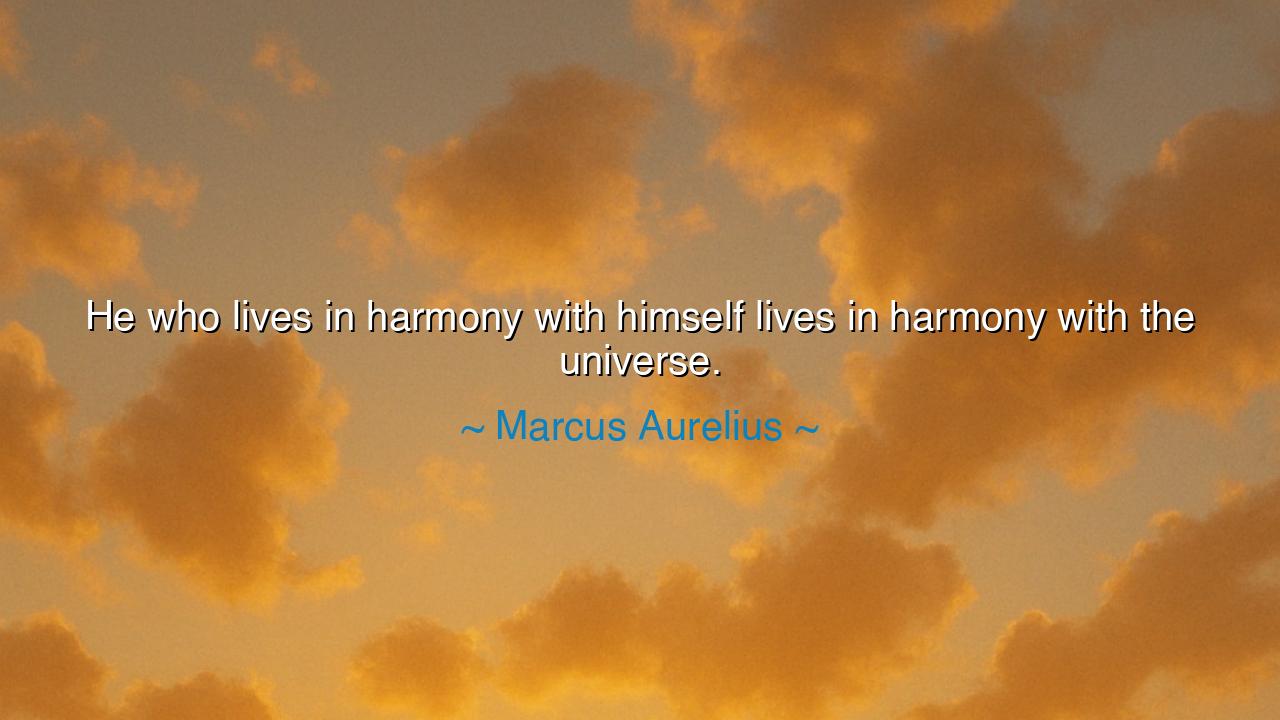
He who lives in harmony with himself lives in harmony with the






The words of Marcus Aurelius, “He who lives in harmony with himself lives in harmony with the universe,” rise from the depths of Stoic wisdom like a hymn to balance. He reminds us that the world outside is not truly separate from the world within. If the soul is troubled, even the brightest day feels heavy; but if the soul is at peace, even storms cannot unsettle it. To be in harmony with oneself—to align thoughts, actions, and desires with reason and virtue—is to tune the spirit to the eternal music of the cosmos.
The ancients taught that the universe is governed by logos, a divine order that shapes all things. To rebel against it is to live in discord, forever clashing with reality. But the man who masters himself, who calms his passions and restrains his pride, finds that his soul begins to move with the same rhythm as the stars. Thus, Aurelius speaks: to rule oneself is to enter into accord with the universe, for the laws of truth and justice that guide the heavens are the same that ought to guide the heart.
History provides us shining examples. Consider Siddhartha Gautama, the Buddha, who sought peace in riches, then in extreme suffering, until he discovered the middle path. By finding harmony with himself, he attained enlightenment, and through his inner peace, he radiated harmony to countless others. His life mirrors Aurelius’ teaching: the way to bring order to the world is first to bring order to the soul.
The emperor himself lived this struggle. Surrounded by war, betrayal, and the burdens of empire, Marcus Aurelius turned inward to philosophy. In his Meditations, written on campaign in distant lands, he wrestled with anger, grief, and pride, and again and again returned to the truth that if he could master his inner state, no outer turmoil could conquer him. His reign remains a testament that leadership grounded in inner harmony can steady even a vast empire.
Let the generations remember: the world cannot give you peace if your heart resists it. Seek not first to control the stars, the seas, or the nations, but to dwell in harmony with yourself. For when the inner battle is won, the outer world falls into its rightful place, and man walks in step with the universe itself. He who is whole within shines without, becoming like the oak rooted deep, unmoved by the storm, yet rising toward the heavens.






DPMinh Dat Phuong
Part of me hears a subtle fatalism: if I’m at peace inside, the cosmos supposedly falls into place—yet the universe is indifferent. Is this claim descriptive (perception shifts) or metaphysical (reality itself harmonizes)? If it’s perceptual, how do we guard against confirmation bias—seeing order because we decided to? If it’s metaphysical, what grounds it—Stoic physics, providence, or natural law? I’d appreciate a historically grounded explanation from Stoic texts that clarifies what “cosmic harmony” actually meant to a Roman emperor-philosopher.
AAbby06
I’m curious about ambition. If I chase promotions, ship products, and hustle, I’m often restless. Does striving inherently undermine the principle here, or can disciplined effort coexist with calm? What practices help—journaling, negative visualization, premeditatio malorum, or nightly reviews—to keep drive from curdling into anxiety? Also, how should I interpret setbacks: as signals to realign with core values, or simply noise? Give me a concrete daily protocol—say, morning intention, mid-day check-in, evening audit—that translates philosophy into repeatable habits.
LLLuc Le
From a psychological angle, this seems to overlap with self-regulation: when my values, emotions, and actions line up, the world feels less antagonistic. But what about trauma, ADHD, depression—states where internal signals clash or misfire? Can therapy, mindfulness, or cognitive reframing operationalize the idea without becoming spiritual bypassing—like soothing ourselves instead of addressing real conflicts? Could you map practical steps: value clarification, emotional labeling, exposure to discomfort, boundaries? And when inner conflict persists, what’s the ethical way to proceed without pretending everything’s fine?
UGUser Google
Beautiful intuition, but I’m torn about how it plays out in messy realities. If inner steadiness is the key, does that risk ignoring unjust conditions that require anger and disruption? For someone facing discrimination, poverty, or war, is seeking inner accord ethically sufficient—or even accessible? Could this teaching unintentionally privilege those whose external world already treats them gently? I’d love a perspective that reconciles personal tranquility with collective responsibility. What would a Stoic say about protests, strikes, or civil disobedience—are they compatible with serenity, or signs of disharmony?